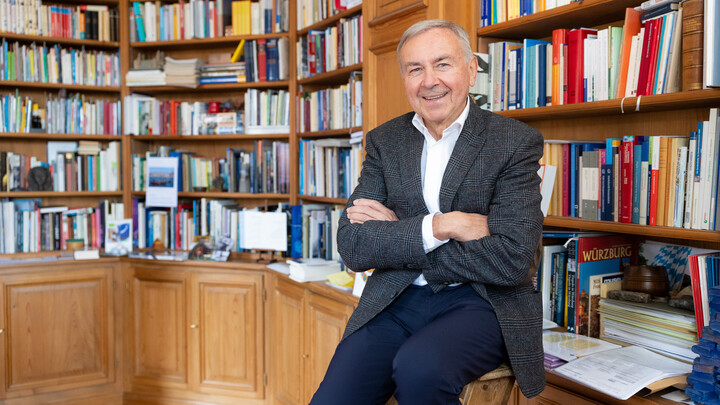What Does a Professor Do after Retiring?
Peter Eichhorn was Professor of Business Administration at Mannheim for 26 years. He retired in 2007—but never stopped working. Since then, he has published 12 books, and he still sits down to work at his desk every day. We paid the retired professor a visit.

Professor Peter Eichhorn lives in a townhouse in the heart of Speyer’s historic quarter, near the cathedral. The house did not always look as nice as it does today. When he bought it, it was pretty dilapidated, with a leaky roof. “Monks used to live here. There were lots of little cells, which is why there are so many windows!” explained Eichhorn, as he showed me to his study, the place where all the magic happens. The room is light, with lots of windows just like in the rest of the house. From his seat at the desk, Eichhorn has a clear view of the cathedral. The walls are lined with books from floor to ceiling, and there is a stepladder in front of the bookcases. At the time of our interview, a stack of blank white paper was neatly arranged in the middle of the desk.
Eichhorn, now 83 years old, became Professor of Business Administration at Mannheim in 1981, specializing in public and nonprofit management. He retired aged 68 at the end of the 2007 academic year, but never stopped writing. On day one of his retirement, he sat down at his desk again early in the morning and began working on a new edition of his textbook Principles of Management. He has published 12 new books since retiring. “I’ve always enjoyed working. Ah, what am I saying? I’ve never worked a day in my life, it’s been my hobby!” was how Eichhorn explained what drives him to be so productive. He smiled as he said it. There is always a gleam in his eyes. During the interview, he was full of passion as he spoke about his life, constantly springing up, clambering up the stepladder, and unerringly picking out a book or two to illustrate details from his stories. It is hard to believe this dynamic man is really 83 years old.
He graduated from high school in the Franconian town of Hof in 1959 and then studied business administration in Nuremberg. Out of 170 students, he was the only to go abroad afterwards, to America, thanks to a scholarship from the German Academic Scholarship Foundation and after successfully passing an English test at the German–American Institute in Nuremberg. “Compared with that test, the high school exams were a piece of cake. English was my weakest subject! I needed a score of 70 to pass and I got 71. It was enough, but only just.” Following his habilitation and spells in Münster and Berlin, in 1972 he was appointed to a post at the German University of Administrative Sciences Speyer. Eichhorn quickly felt at home in the mid-sized town. He became chair of the local art association and expanded it to over a thousand members. He has retained an interest in art and medieval church architecture ever since. As a young man, he spent a whole summer hitchhiking through the UK to study rose windows in cathedrals.
When he was later invited to take up a post in Mannheim, he did not have to think twice. Two factors decided it for him: Mannheim’s proximity to his beloved Speyer, and its stellar reputation for business studies. Eichhorn spent 26 years at the University of Mannheim, during which time he published several hundred journal articles. He supervised 46 doctoral candidates, 20 of whom have become professors—a figure that fills him with pride. “The ethical side of business has always been important to me. Just because we can do something, doesn’t mean we should.” If you look at the stack of 12 books Eichhorn has published since retiring, the breadth is striking: The titles on the spines, translated from the original German, include Walls; A New Perspective on Art; The Outcome-Impact Method; The Powerlessness of Cities; The Potential of the Provinces; and Dialogues with My Ancestors and Descendants. “The nice thing about retirement is the freedom to explore different ideas in my publications. I draw inspiration from all sorts of things and I write, read, and research every day.” Before writing, you have to think rigorously about a topic and then commit those ideas to paper—something the emeritus professor greatly enjoys. He is currently working on a book about democracy. As we spoke, his gaze flitted to the stack of blank paper on his desk, and he laughed. “They’re waiting for me. I write everything by hand. I need to be able to put pen to paper, that’s what makes me happy.”
Text: Jule Leger/
